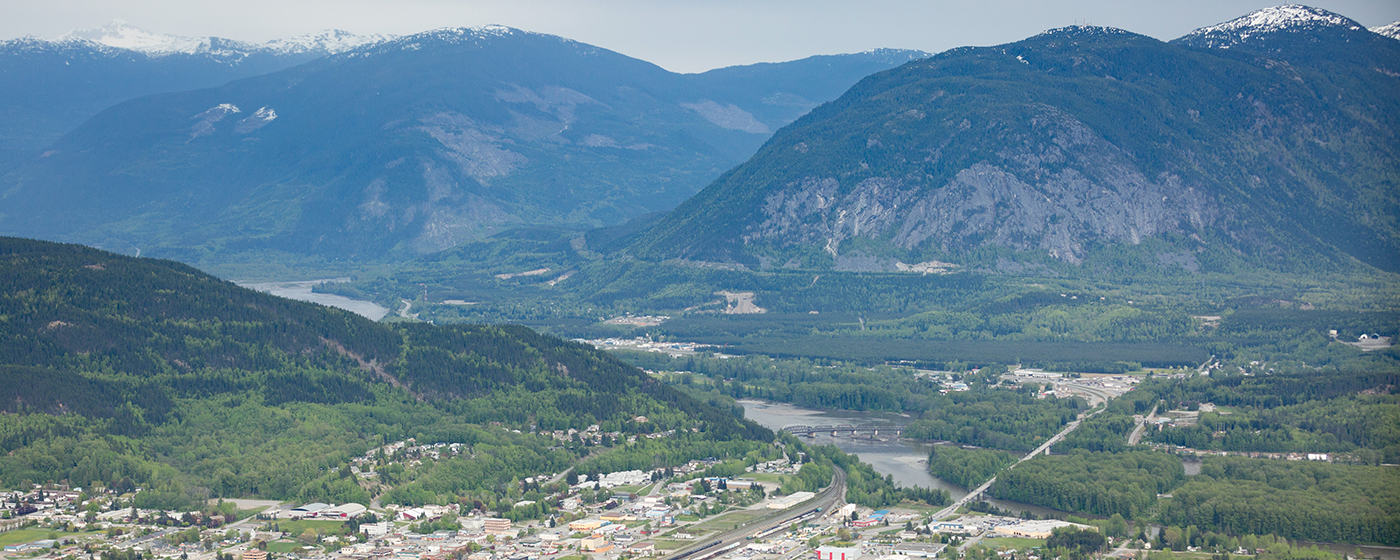2017 Update
Major Projects in Kitimat and the surrounding area
Rio Tinto Modernization - Complete
The $4.8 billion (US) Kitimat Modernization Project (KMP) is complete. The modernized aluminum smelter began operating in mid-2015 providing full-time employment for approximately 1,000. Modernization increased the smelter's production capacity by 48% to approximately 420,000 tonnes of aluminum ingot per year using the most cost effective, energy efficient and environmentally friendly technology available. The company announced the final investment decision for the project on December 1, 2011. Construction labour at peak (fall 2014) was approximately 3,400 including 1,000 local persons.
Kitimat LNG
Chevron Canada and Woodside Canada each hold a 50% stake in the Kitimat LNG terminal, Pacific Trail Pipeline and 644,000 gross undeveloped acres in the Horn and Liard River basins in northeastern BC. Kitimat LNG will have an initial capacity to produce 700 million cubic feet of natural gas per day or five million tonnes of LNG per year. In October 2011, the National Energy Board granted a permit to export up to 10 million tonnes of LNG annually over 20 years. In January 2014, the Engineering, Procurement and Construction (EPC) contract was awarded to a joint venture involving Fluor Canada and JGC Corp of Japan. Required labour is estimated to be 3,000 - 5,000 jobs during construction and 100 – 200 permanent jobs upon completion. The project is subject to a final investment decision. Site preparation and other early works are ongoing, along with construction of temporary worker accommodation on the site of the former Eurocan Pulp & Paper Mill.
Pacific Trail Pipeline
A new 42", 470km pipeline to supply gas from Summit Lake, BC (north of Prince George) to Kitimat LNG for export. PTP is expected to move one billion cubic feet of natural gas per day. Provincial and federal environmental approvals were granted in 2008 and 2009 respectively. Front End Engineering and Design Study was undertaken in 2010. The First Nations Limited Partnership for the PTP project ensures all 16 First Nations whose traditional territory is located along the pipeline route will receive immediate and long-term benefits from the project. A final investment decision is expected to be made in conjunction with the Kitimat LNG project. Chevron Canada and Woodside Canada are each 50% owners of PTP.
LNG Canada - $25 billion to $40 billion
In May 2012, Shell Canada formally announced the development of a proposed two billion cubic feet per day LNG export facility on the site of the former Methanex methanol plant. LNG Canada is a joint venture led by Shell (50% interest) along with PetroChina Co. (20%), KOGAS (15%) and Mitsubishi (15%). On May 20, 2014 it was announced that CFSW LNG Constructors (a partnership of Chiyoda, Foster Wheeler, SAIPEM and WorleyParsons) will be the main contractor for construction of the LNG Canada facility. The project consists of the construction and operation of natural gas treatment facilities, liquefaction and storage facilities, marine terminal facilities, an interconnecting cryogenic transfer pipeline, and supporting infrastructure. LNG Canada will initially consist of two trains, each with the capacity to produce six million tonnes of LNG per year, with an option to expand the project in the future. Approximately 5,500 - 7,500 jobs will be created during construction and 400 – 800 for operations. In February 2013, the National Energy Board (NEB) approved a permit to export up to 24 million metric tonnes of LNG annually over 25 years. A project description was filed with the federal and provincial environmental assessment agencies in April 2013. In November 2014, a power agreement was reached with BC Hydro to allow LNG Canada to use clean, renewable electricity for ancillary needs. The project received provincial and federal Environmental Assessment Certificates in June 2015. In January 2016, a 40-year export licence was granted by the NEB. The project awaits a final investment decision before moving into development.
Coastal GasLink - $4 billion
TransCanada Corp has been selected by Shell Canada and its partners to design, build, own and operate the proposed Coastal GasLink project, a 48", 700km pipeline that will transport natural gas from the Montney gas-producing region near Dawson Creek, BC to the LNG Canada export facility in Kitimat. The pipeline will have the capacity to move 1.7 billion cubic feet of natural gas per day. Construction jobs are estimated at 2,000 – 2,500 over a three year construction period. Coastal GasLink received an Environmental Assessment Certificate in October 2014. The pipeline is expected to be in service near the end of the decade, coinciding with the LNG Canada plant commencing operations.
Pacific Northern Gas Looping Project
Pacific Northern Gas (PNG) is proposing to upgrade its gas transmission capacity by looping (or twinning) its existing natural gas pipeline between Summit Lake, BC and Kitimat. The new pipeline will increase the overall capacity of the PNG transmission system in order to meet the requirements of its existing customers and new small-scale LNG projects proposed for construction in Kitimat. The project involves construction of approximately 525km of new 24" pipe operating in parallel with the existing 10" pipeline. The project would also include replacement of four existing compressor stations and would have an initial capacity of 600 million cubic feet per day. A project description was filed with the federal and provincial environmental assessment agencies in July 2013.
Cedar LNG
In August 2014 the Haisla First Nation submitted three separate applications to the National Energy Board for LNG export licences. The applications seek approval to export varying quantities of LNG to Asian markets from either barge-based or floating LNG vessels at up to three locations along the west side of the Douglas Channel. Each application relates to separate and independent commercial arrangements with gas producers, purchasers and shippers. Pipeline capacity required to transport natural gas to Cedar LNG could include a mix of new and already-proposed third party infrastructure. Construction is anticipated between 2017 and 2020.
Kitimat Clean Refinery - $32 billion
In August 2012, Kitimat Clean Ltd submitted a proposal to build a large oil refinery in the Kitimat Valley to process heavy crude oil delivered by rail. An environmental assessment is in progress. The refinery will process 550,000 barrels of diluted bitumen per day, producing 240,000 barrels per day of diesel, 100,000 barrels per day of gasoline, and 50,000 barrels per day of aviation fuel. Approximately 6,000 workers will be required during the construction phase and 3,000 permanent full time jobs upon completion. In April 2013, Kitimat Clean signed a Memorandum of Understanding with the Industrial and Commercial Bank of China which will serve as financial advisor and cooperate in the financing of the project. In June 2014, Hatch Ltd was contracted to conduct a basic engineering design, and Expander Energy entered into an agreement with Kitimat Clean to license its FTCrude refining process.
Pacific Future Energy - $15 billion
A formal proposal to build and operate a bitumen-to-fuels refinery at Dubose Flats (halfway between Kitimat and Terrace) was submitted to First Nations governments and federal and provincial regulators in January 2016. The project would receive near-solid neatbit bitumen by rail from western Canada and refine it into diesel, gasoline, and other products for export to world markets. Pacific Future Energy plans to power the refinery with clean-energy sources that include biomass wood-waste from the regional forest industry. The project will create an estimated 3,500 direct jobs in construction and 1,000 in operation. Construction could begin in 2018 and production in 2021.



